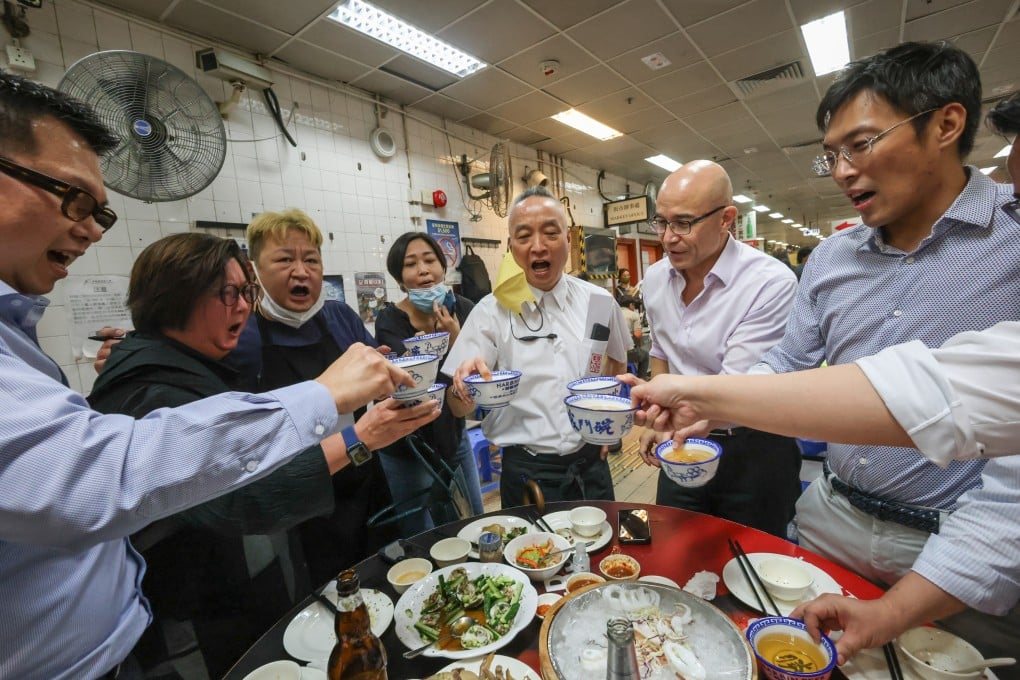How different cultures toast to good health – from ‘yum bui!’ to the old-fashioned ‘chin-chin!’
‘Yum bui’ were among the first Chinese words taught to Europeans arriving in Hong Kong, while ‘Bottoms Up’ is also the name of a Tsim Sha Tsui bar

From Hong Kong’s mid-19th century urban beginnings, celebratory occasions have typically involved toasts. Across a variety of cultures, the ceremonial raising and clinking of glasses – whatever the contents may be – symbolises goodwill. The expressions used and the languages deployed have varied considerably over time. While usually little more than a polite indication to begin drinking on the part of the host, different layers of meaning are expressed in other circumstances.

In earlier, less-fractious times, October 1 celebrations marking the establishment of the People’s Republic in 1949 were marked by a reception at the New China News Agency (Xinhua) in Hong Kong. The local Xinhua branch’s then director and the governor of Hong Kong would ritually exchange greetings and clink glasses – an annual show of diplomatic bonhomie between the representatives of two sovereign powers that said much about mutual efforts towards genuine cooperation and goodwill for the wider benefit of the city and its peoples.
A hearty “Cheers!” remains the general standard across ethnic groups and socio-economic divides, and has stood the test of time. Drinkers who may know no other word of English are – especially if male – likely to know that one phrase, and be fully aware of how and when to use it.
Other once-commonplace toasts have come and gone, and periodically enjoy a revival. “Chin-chin” is an old-fashioned glass-raiser with Chinese origins that, in the first half of the 20th century, enjoyed global popularity through the comic novels and short stories of P.G. Wodehouse. Two generations acquired much of their slang from his hilarious writings, and in places where his works remain popular, such as India, the terminology contained within them persists.

“Bottoms up!” is another old favourite, which both suggests draining the glass in a few gulps and also the next state of being should a few too many be indulged. This toast was also the name of a long-standing Kowloon bar – where the barmaids and waitresses were topless. Opened in 1971, Bottoms Up was managed for many years by the late, legendary Pat Sephton. Before moving to Hong Kong, she had been a performer at the famous Windmill revue in London, where at the end of each routine the dancers suddenly dropped their costumes and then stood – stock-still and stark naked. To many older Hong Kong residents, this toast, the long-vanished Tsim Sha Tsui bar and its redoubtable British “mamasan” remain closely synonymous.

Other ethnic groups had their own time-honoured family toasts. One local Portuguese friend, whose grandfather came to Hong Kong from Macau in 1841, typically raised her glass – which usually contained that old colonial staple BGA (brandy-ginger-ale) – with the single word, “Viva!” – “Alive!” Apparently also used by her father, and presumably earlier generations, this simple toast continues; every year on her birthday, a glass raised with a “Viva!” – and the many “saudades”, or “nostalgic recollections” that the simple term invokes – brings back warm memories of that long-ago, much-valued friendship.
Among the first Chinese words recently arrived Europeans to Hong Kong were taught was the expression “Yum bui” – literally “drink a cup!”. For many, this useful, friendly phrase also remained the lifelong limit of their linguistic endeavours. “Yam seng” – literally “drink to victory!” – was another commonplace variant. Unsurprisingly, and especially so given that these libations were usually hard spirits of various kinds, rapid intoxication followed.

Public drunkenness remains unusual in Hong Kong; booziness is generally looked askance at in Chinese society, except at certain ritualised occasions, such as wedding banquets, where some degree of intoxication is both expected and tolerated.
